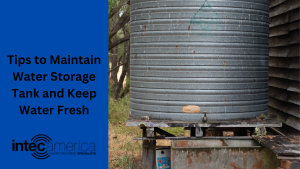Storing water is important for making it easily available for everyone, be it outdoors or households. However, it is essential that the water storage tank is cleaned and refilled on a periodic basis. Any drinking water tank must be free of contaminants, particles, bacteria, algae, and more. The weekly water storage tank maintenance is essential to keep it clean and water inside safe to consume. These drinking water tanks may be installed underground or above on the surface. Depending on this aspect, water storage capacity, and utilization, one can come up with a schedule for cleaning these tanks. There are many ways to keep these tanks clean, which include use of chemicals, chlorine, copper ionizers, and more. This post discusses the same.

Different Aspects to Consider for Water Storage Tank Maintenance
Here are some factors to consider that will help maintain your drinking water tank and keep the water safe and potable.
- Water storage tanks should be made of good quality materials such as sturdy plastics and galvanized metals. The most commonly used materials include polyethylene, stainless steel, copper, and so on.
- These tanks range from a few liters to a few gallons in terms of water storage, while the large ones are mostly used by water treatment and supply departments of governments or municipal corporation bodies, the small ones are suitable for gated communities or even household level.
- There are contaminants of various kinds such as bacteria, soil, particulate matter that percolates with water along the way through pipelines, different forms of algae, and so on. These tanks must be placed in areas with low light. This prevents algae and bacterial growth.
- Consider connecting your home or community level tank with a filtration system, which will ensure clean water. Installing a water purifier comprising RO and carbon filters along with UV at the point of entry ensures treated water is stored in the tank.
- Regular cleaning of any tank is a must, and this depends on the water storage capacity and the consumption rate. Usually, any regular tank of 10- to 50-liter capacity must be cleaned at least once or twice in a week. The large tanks store a few gallons of water, and especially the ones that are underground can be cleaned once in a month or two. It is best to get large tanks cleaned by professionals. Even with small tanks and filtration systems need to be cleaned by professionals at least twice in a year. Professional servicing in case of filtration system includes cleaning and replacing filters.
- In case of large tanks at water supply department level, it is common to add chlorine to the water as it is stored for long durations and yet needs to stay clean. However, rather than adding chlorine or alike chemicals, using ionizers is a safer option which keeps the water clean and free from bacteria as well as other contaminants.
- Regardless of the frequency of cleaning these water storage tanks, it is crucial to conduct a visual inspection and check for changes in color, consistency, density, and other physical properties of water. In case of any doubt, give some sample for lab testing. Discard that water safely in case it is contaminated. Do consider the standards for environmental safety when discarding contaminated water.
- Nowadays, technology plays a huge role in all aspects of our day-to-day life. The same applies for water storage. There are various digital devices to check multiple parameters of water quality that are handy and easy to use.
If you are looking for safe and sustainable cleaning solutions for your water storage solutions, then avoiding chemicals would be a wise choice. Using ionizers is ideal; however, you need to source them from reliable and known manufacturers and suppliers. Intec America offers high-quality and safe solutions for residential and commercial water treatment. This includes the type of water storage tanks used, their cleaning, and their use in various segments including contingency planning. In fact, Intec America was the first company in the US to commercialize the copper ionization technology initially developed by NASA. The company offers pressure tanks and atmospheric tanks for water storage as well as end-to-end solutions such as ionizers for water treatment.
Recent Blog Posts
- How Alkaline Ionized Water Can Improve Your Health?
- Undersink Filters vs Whole House Water Filtration Systems – Know the Real Difference
- Things You Must Know About pH Control and Drinking Water Treatment
- Reasons to Avoid Pool Water Care Chemicals
- Seasonal Pool Maintenance Costs and Chlorine Alternatives for Pool Sanitization


